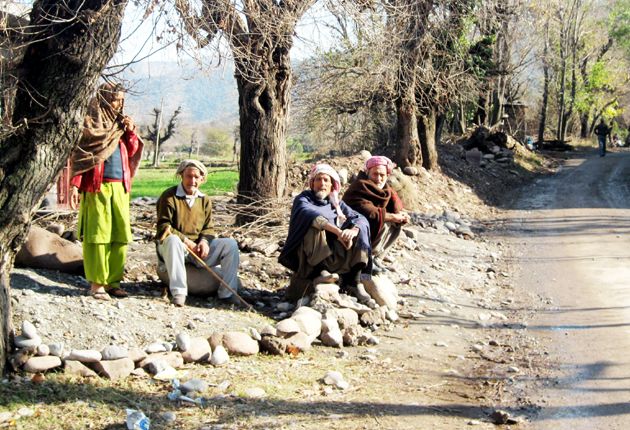Rameez Raja
The entire night, ear-deafening sound of firing and shelling across the border dominated the sky. That night, all of Shayeen’s familystayed together in one room as they were not too sure whether they will wake up the following morning. In that tense hour, they were equally worried about the livestock tied outside the house – with no shelter. Shayeen, in the meanwhile,kept thinking about her father who is posted in Doda – unaware of the situation.
“I wish I could have called my father and listened to his voice, as we waited for our deaths,” said this eighteen-year old girl from Bharooti, a non-descript village tucked away in theborderland of PoonchDistrict in Jammu Kashmir. Her inability to call her father is not related to not having a mobile phone but the unavailability of mobile phone towers in the village.
The “waiting for death” moment is not new to those who hail from villages like Bharootilocated merely 5-6 kilometers from the Line of Control (LoC).
Last year, it started with the killing of two Indian Soldiers at the LoC in January which was followed by the recent killings of five soldiers in August. In the aftermath of such killings, a total of 150 incidents of ceasefire violations have transpired last year, the highest in the past eight years.
For those residing away from the border, ceasefire violation is justnews but for the ones living it, it is a nightmare. To compound the problem, they have to face the development challenges all alone as no one is there to take care. Right from education, health, employment, roads, water, and connectivity – very few basic facilities are available for them.
One of the major challenges faced by those inhabiting near zero line is zero connectivity. Not much talked about but a challenge that affects their life quite severely.
Sixty-two year old Rasham Bi, a resident of village Ghani while sharing her experience said, “Last month, I had to go to the sub-district hospital in Mendhar as I was feeling unwell. I was alone as my only son lives in Saudi Arabia working as a labourer there. Doctors, post checkup, suggested that I get admitted to hospital for a minimum of two days.”
It left the old lady in distress as although she had a mobile phone she couldn’t contact her daughter back home as there is no tower in her village. Later that night, her daughter had to come searching for mother spending nine hundred rupees on a hired cab. Availability of a single mobile phone tower could have avoided the chaos.
RabinaKousar, a resident of Village Ucchad narrates the story of her mother-in-law who had to travel approximately twenty one kilometers to reach a STD booth in Mendhar Tehsil to talk to her son currently residing in Saudi Arabia. “Network connectivity is a major issue in our village. Hapless, we have to travel long distances and spend huge amounts to make just one call. We feel cursed to spend our lives in isolation,” rues Kousar.
One would assume difficult geography and inaccessibility of these border villages is the reason behind the situation but, not very far from Poonch town (approx. six kilometers) lies another village Salotri confronted by similar problem. Located on the zero line, this village despite its sensitive location is deprived of network facility. “Our mobile phones at times catch network of Pakistani service providers but our own network facility is pathetic,” expressedSuresh Kumar, Sarpanch of the village.
People of Poonch suffer from both the ends. On one hand, the extreme weather conditions be it rain or snowfall, always disrupts their normal life and on the gory other, the worrying ceasefire violations at the border does not allow them mental peace. Amid all this, mobile phones, they thought, would be the means of staying connected with their loved ones but poor services rendered them hopeless. Handsets they bought saving every single penny lie useless today.
In July last year, Member Parliament Jammu Poonch Constituency, Madan Lal Sharma called upon the BSNL authorities to improve the BSNL Services particularly mobile connectivity and enhance its reach to the uncovered areas.Sharma stressed upon the need of installing towers in Border Villages so that people of border areas can also avail the benefit of mobile and internet services. He asked the officers to improve BSNL mobile connectivity while referring that the private Telecom players are offering better mobile connectivity as compared to BSNL despite BSNL having largest infrastructure, Govt. support.
Another important decision came in May last year fromUnion Minister of State for Communication and Information Technology, KruparaniKilliwho said that one hundred and fifty new mobile phone towers would soon be set up in Jammu and Kashmir to strengthen the state’s communication network. “People of Poonch have been shown living in such false hopes for a long time now. No one understands the pain we undergo in difficult times,” said Nazam Din Mir, a social activist from border village Keerni suggesting that there is an urgent need of roping in other service providers for better services.
Hopefully the message will reach the concerned authorities via this “network”!
(Charkha Features)
Trending Now
E-Paper


